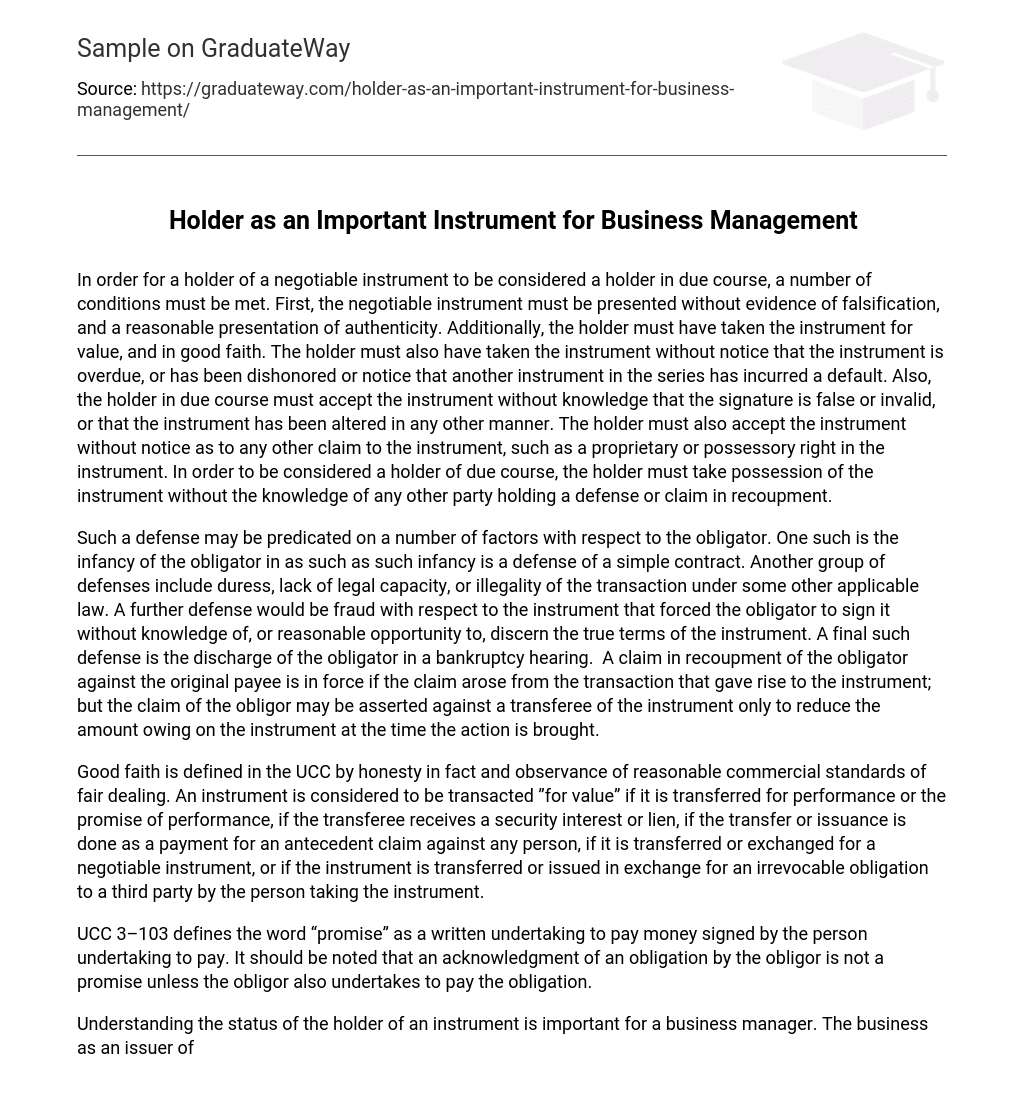In order for a holder of a negotiable instrument to be considered a holder in due course, a number of conditions must be met. First, the negotiable instrument must be presented without evidence of falsification, and a reasonable presentation of authenticity. Additionally, the holder must have taken the instrument for value, and in good faith. The holder must also have taken the instrument without notice that the instrument is overdue, or has been dishonored or notice that another instrument in the series has incurred a default. Also, the holder in due course must accept the instrument without knowledge that the signature is false or invalid, or that the instrument has been altered in any other manner. The holder must also accept the instrument without notice as to any other claim to the instrument, such as a proprietary or possessory right in the instrument. In order to be considered a holder of due course, the holder must take possession of the instrument without the knowledge of any other party holding a defense or claim in recoupment.
Such a defense may be predicated on a number of factors with respect to the obligator. One such is the infancy of the obligator in as such as such infancy is a defense of a simple contract. Another group of defenses include duress, lack of legal capacity, or illegality of the transaction under some other applicable law. A further defense would be fraud with respect to the instrument that forced the obligator to sign it without knowledge of, or reasonable opportunity to, discern the true terms of the instrument. A final such defense is the discharge of the obligator in a bankruptcy hearing. A claim in recoupment of the obligator against the original payee is in force if the claim arose from the transaction that gave rise to the instrument; but the claim of the obligor may be asserted against a transferee of the instrument only to reduce the amount owing on the instrument at the time the action is brought.
Good faith is defined in the UCC by honesty in fact and observance of reasonable commercial standards of fair dealing. An instrument is considered to be transacted ”for value” if it is transferred for performance or the promise of performance, if the transferee receives a security interest or lien, if the transfer or issuance is done as a payment for an antecedent claim against any person, if it is transferred or exchanged for a negotiable instrument, or if the instrument is transferred or issued in exchange for an irrevocable obligation to a third party by the person taking the instrument.
UCC 3–103 defines the word “promise” as a written undertaking to pay money signed by the person undertaking to pay. It should be noted that an acknowledgment of an obligation by the obligor is not a promise unless the obligor also undertakes to pay the obligation.
Understanding the status of the holder of an instrument is important for a business manager. The business as an issuer of a negotiable instrument may still be responsible for payment even if the promised consideration for the instrument is faulty. This could happen if the party in receipt of the negotiable instrument changes possession to a party with a status of holder in due course as defined as the UCC. Such a party has claim to the terms of the negotiable instrument notwithstanding the status of the original transaction.
On this other side of the equation, if a business, as the recipient of a negotiable instrument, is not a holder in due course under the UCC, that business may not be eligible to claim the consideration owed under terms of the instrument. Thus it is vital for a business owner, manager, or anyone who is instrumental in the negotiation of instruments to understand the conditions and limitations of the status of holder in due course, and to ensure that as a recipient of negotiable instruments, the corporate entity he or she represents is in fact a holder in due course.





